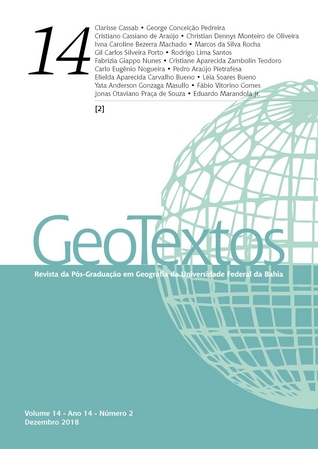THE QUILOMBOLAS TERRITORIAL COUNCILS IN THE STATE OF BAHIA: MECHANISMS FOR A PROCESS OF SOCIAL CONTROL AND TERRITORIAL GOVERNANCE
DOI:
https://doi.org/10.9771/geo.v14i2.26949Keywords:
Public Policies, Quilombola Communities, Quilombola Territorial Councils, Social Control, Territorial GovernanceAbstract
The Quilombola Territorial Councils are an initiative of SEPROMI-BA, the State Secretariat for the Promotion of Racial Equality, and its objective is the construction of participatory and deliberative spaces where quilombola communities can organize, defend and vindicate their interests and needs; in particular, their access to public policies and programs, thus contemplating the concept of political governance through a process of social control within the territory of Bahia. This process, on the other hand, presents numerous challenges and perspectives in the cultural and political construction of these democratic practices, with a view to valorizing black people, their roots and building new expectations about the planning of their territories. It is from this perspective that the discussion that orbits the present article is introduced: the addition of the spatial category to the concept of governance, in this case, immaculate in the concept of Territorial Governance, whose imbrication to the key concept originating from Political Science is constructed to form the interpretation that such participatory and deliberative capacity also helps a society organized territorially in the management of public affairs from the joint and cooperative involvement of social, economic and institutional actors, emphasizing the spatialization of governance and social control.Downloads
Downloads
Published
How to Cite
Issue
Section
License
Autores que publicam nesta revista concordam com os seguintes termos:
Autores mantém os direitos autorais e concedem à revista o direito de primeira publicação, com o artigo simultaneamente licenciado sob a Licença Creative Commons Creative Commons CC BY que permite o compartilhamento do trabalho com reconhecimento da autoria e publicação inicial nesta revista. Esta licença permite que outros distribuam, remixem, adaptem e criem a partir do seu trabalho, mesmo para fins comerciais, desde que lhe atribuam o devido crédito pela criação original. É a licença mais flexível de todas as licenças disponíveis. É recomendada para maximizar a disseminação e uso dos materiais licenciados. Ver o resumo da licença em: https://creativecommons.org/licenses/by/4.0/ Ver o texto legal da licença em: https://creativecommons.org/licenses/by/4.0/ Consulte o site do Creative Commons: https://creativecommons.org/licenses/?lang=pt
Autores têm autorização para assumir contratos adicionais separadamente, para distribuição não-exclusiva da versão do trabalho publicada nesta revista (ex.: publicar em repositório institucional ou como capítulo de livro), com reconhecimento de autoria e publicação inicial nesta revista.
Autores têm permissão e são estimulados a publicar e distribuir seu trabalho online (ex.: em repositórios institucionais ou na sua página pessoal) a qualquer ponto antes ou durante o processo editorial, já que isso pode gerar alterações produtivas, bem como aumentar o impacto e a citação do trabalho publicado (Veja O Efeito do Acesso Livre).






